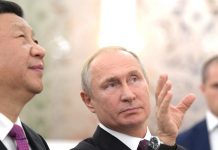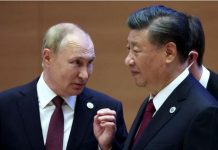“The Balkans have once again become an arena of great power competition, this time between China and the US. For Washington, Beijing’s inroads in Southeast Europe have become part of the larger US-China global competition which, after growing for years, escalated into full-blown strategic rivalry in 2017 that some analysts have described as a ‘New Cold war’
Ivan Lidarev, is the 2023/24 Mladena and Dianko Sotirov Visiting Fellow at LSE IDEAS, recently completing his PhD in International Relations and Political Science
at King’s College London wrote a paper on the topic.
He presented his findings at a discussion on Nov. 29 at led by Prof. Michael Cox, the founding director of LSE IDEAS think tank. I attended the event along with scholars and other journalists including Alec Russell, the foreign editor of the Financial Times.
Dr Eli Gateva, a Lecturer in European Union Politics in the Department of Politics and International Relations at the University of Oxford and Ana Krstinovska a CHOICE Research Fellow and the President of the North Macedonian think tank and consultancy ESTIMA.also took part in the discussion hosted by the Ratiu Foundation in London.
These are the most interesting excerpts from Dr. Lidarev’s paper.
He said that the „interplay between China’s expanding influence in the region and the US pushback against is increasingly influencing the strategic situation in the Balkans and the policies of Balkan states. On the surface it might seem that the China-US competition for influence in the Balkans is focused on dominating the Balkans with all the economic, political, and security benefits that ensue. ”
„However, such reading is deeply misleading. Washington is the preeminent power in the region, with its position buttressed by NATO’s overwhelming presence in Southeast Europe and the Mediterranean, close bilateral relations with most Balkan countries, and the EU’s expanding membership in the region. ”
Being thousands of kilometers away, China simply cannot challenge the US’s dominant position in the Balkans and does not want to do so. Instead, Beijing hopes to use the Balkans as a gateway to the EU through which its influence, trade, and investment in the union can flow.
In this way, China hopes to gain an advantage in its larger, global competition with Washington. As a result, from the standpoint of the China-US competition the Balkans are a Chinese gate to Europe. Beijing wants to open this gate, while the US wants to shut it.
Firstly, the competition has created a new competitive strategic framework for the Balkan states in which China has emerged as a counterweight to the West, prompting the US to reengage the region. Washington has succeeded in partly reducing Beijing’s influence but has not eliminated it. Secondly, seeing this competition as a strategic opportunity, most Balkan states have responded by aligning themselves with the US and partially distancing themselves from China, in order to advance their own interests. Serbia has been the major exception, as it has tried to use China to gain some diplomatic leeway and balance the US and Europe. Thirdly, the competition has major implications for both Europe and the Balkans. For Europe, the competition plays a role in the larger contest between Beijing and Washington to influence the EU and its relations with China. For the region, it promises economic development and faster integration with the EU, but also burdens Balkan states with constraints on their beneficial relations with China and risks from the ‘New Cold War’.
More broadly, the US has gained the upper hand in the Balkans but that Chinese influence in the region is here to stay and has a chance to eventually achieve its strategic goal of using the region as a gateway to the EU. Balkan states are seeing this China-US competition as an opportunity and strive to use it to their own advantage.Most have aligned their China policies with Washington for now, but this alignment can shift with their cost-benefit analysis.
The rise of China’s influence
While Beijing enjoyed special relations with Albania and Romania during the Cold War, its influence in the Balkans during the first decade of the Twenty-First Century was limited. More importantly, despite growing interest from Balkan countries such as Serbia, to China showed relatively little political or economic interest in the region and did not have a strategy toward it. All this began to gradually change in the aftermath of the 2008 global financial crisis, as China made a push to engage with the region.
Two years, 2012 and 2013, were key to this new Chinese engagement with the Balkans. In 2012 Beijing inaugurated the ‘16+1’ mechanism between China and sixteen Central and Eastern European countries, which demonstrated that investing in the Balkans and developing much closer economic and political relations with the region is a priority for China, as part of its wider outreach to Central and Eastern Europe (CEE). The following year, 2013, Chinese President Xi Jinping announced China-US Competition in the Balkans.
Impact, regional responses, and larger implications
BRI highlights the importance of Southeast Europe for China and its investment plans, as one of BRI’s corridors is projected to pass through the region on its way to Central Europe and Germany. Both ‘16+1’ and the BRI were launched against the background of the 2008 world financial crisis which weakened the West and, much more importantly for the Balkans, the Eurozone crisis. These twin crises severely damaged Europe’s economies, undermined the EU’s political position in the Balkans, and massively increased the region’s need for Chinese investment to replace the dwindling flow of EU investment. In short, just as Beijing began to engage with the region, Balkan states showed much greater interest in China.
But what lies behind this post-2008 Chinese engagement with the Balkans?
The answer is a strategy to take advantage of the Balkans as Europe’s ‘soft underbelly’ a relatively underdeveloped region only partially integrated into the EU, to expand China’s influence in Europe. Such influence would help China to achieve two important strategic goals. First, it will facilitate China-Europe connectivity and expand China’s trade with the EU, presently Beijing’s largest trading partner. Second, it will enable Beijing to solidify its influence and eventually gain key economic positions within the EU. The logic is simple. Chinese economic presence and political influence in non-EU Balkan countries, such as Serbia and North Macedonia, will eventually end inside the EU, once these countries join the union.
Soon after 2012, China began to implement its strategy in the Balkans as part of its larger engagement with CEE in the format of the former ‘16+1’. Investment The logic is simple. Chinese economic presence and political influence in non-EU Balkan countries, such as Serbia and North Macedonia, will eventually end inside the EU, once these countries join the bloc.
In the last decade China has invested, or shown interest in, investing in ports, roads, railways, and bridges across Southeast Europe. China’s investment in Greece’s Piraeus port, which Chinese President Xi Jinping praised as the ‘dragon’s head’ in the Mediterranean, is the most important such investment.[6]
After an original agreement between Athens and the Chinese company COSCO to run the port in 2008, COSCO bought stakes in the port in 2016 and 2021, presently owning 67% of the Piraeus Port Authority (PPA).[7] As a result of Chinese involvement in the Piraeus port, in which COSCO’s relations with influential Greek ship owning interests played a key role,[8] the port’s shipping has greatly increased, turning it into the sixth largest in Europe.[9] Beyond Piraeus, China has signalled interest in several ports in the Balkans, including Burgas in Bulgaria, Thessaloniki in Greece, and Rijeka in Croatia; although, its investment efforts have been mostly unsuccessful partly due to US and EU pressure on host states.
There has been substantial Chinese investment in roads, railways, and bridges in the Balkans. The Bar-Boljare highway in Montenegro, to be completed by China Road and Bridge Corporation, is arguably the most famous Chinese highway investment in the region. Financed by a nearly $1 billion loan from China’s Export-Import Bank, the project massively increased Montenegro’s indebtedness and forced Podgorica to turn to a EU-brokered deal to repay its debts.[12]
Besides roads and railways, Chinese companies have also played a role in bridge construction in the Balkans. The Pelješac Bridge in Croatia is the most significant such project. A key piece of infrastructure connecting the southernmost parts of Croatia with the rest of the country, the bridge was constructed by a Chinese company but mostly financed by the EU.
For China the bridge was important way to enter the EU market and bid for future EU projects.[14]
It is crucial to note here that many of China’s transportation projects in the region are part of a larger plan to build a transportation corridor called the China–Europe Land–Sea Express Route (LSER). LSER aims to connect the Greek port of Piraeus with Budapest through North Macedonia and Serbia and in this way give Chinese companies easier access to the markets of Central Europe and Germany.[17]
Nevertheless, Chinese investment in the region goes beyond transportation infrastructure. In Serbia, China’s key regional partner, Chinese companies have invested in such diverse projects as the Smederevo Steel Mill,[20] the copper mining complex RTB Bor[21], and a tyre factory in Zrenjanin.[22]
However, Chinese companies have also faced substantial setbacks in the energy sector. These include high-profile projects in Romania: building units for the coal-burning Rovinari Power Station and the Cernavoda nuclear powerplant, both eventually abandoned by the Romanian government.
Beyond large projects, Beijing has gradually promoted its influence in the region in other ways. One has been to establish what Bulgarian expert Vladimir Shopov calls ‘networks of influence’. Through these networks China engages local elites, political parties, universities, municipalities, think tanks and business organizations in order to promote its influence on subnational level.[26]
In terms of elites and political parties, China has established connections in Romania with leaders from the country’s political left, such as former prime ministers Adrian Năstase and Victor Ponta,[27] while in Bulgaria it has maintained a low-level relationship with the long-ruling GERB part. Academically, China has developed relations with various universities, such the Lucian Blaga University of Sibiu, Romania,[30] and the Agricultural University Plovdiv, a hub of agricultural cooperation between China and Bulgaria,[31].
Another way for China to expand its influence has been digital. China’s Huawei has partnered with Serbia’s government to develop ‘smart cities’ in Belgrade, Novi Sad, and Niš, inaugurating a ‘safe city’ project with Belgrade which has seen the installation of 1,000 surveillance cameras in 800 locations across the city. Huawei has also made a concerted effort to develop the region’s 5G network but has been stymied, mostly due to US efforts.
Lastly, China has striven to promote its influence in the Balkans by cultivating soft power in the region. Beijing has established a network of Confucius Institutes, with at least one per country and more in larger countries like Greece, Serbia, Bulgaria, and Romania. China has also been active in the region’s media landscape with country-specific programs by China Radio International (CRI),[41] news cooperation agreements between Xinhua News Agency and various regional information outlets,[42]
Against this background, three important points need to be made about Beijing’s expanding influence in the Balkans. First, China has made the establishment of a special relationship with Serbia the centerpiece of its strategy in the region. Serbia is a natural partner for Beijing because it is the only large Balkan country that is not part of NATO and the EU and has troubled relations with the US, due to the Kosovo dispute and the legacy of Washington’s intervention in the Yugoslav wars.
Second, the results of China’s attempts to engage the region and build up its influence have been mixed. Together with many successes, there have been quite a few failures and delays. The Budapest-Belgrade railway, have progressed very slowly and with difficulty.
Third, Chinese influence in the Balkans is substantial and real, but should not be exaggerated. China is a latecomer to the region and geographic distance means that both its impact on the region and interest in it are constrained.
Beijing’s influence in Southeast Europe is lagging far behind that of the EU and the US, politically, militarily, and, to a lesser extent, economically. This holds true even for Serbia, Beijing’s most important partner in the region.
It is Germany, not China, which is Serbia’s largest trading partner, while China is Serbia’s ninth largest export destination.
US Pushback
The rise of China’s influence in the Balkans has rung alarm bells in the West and, after some delay, provoked a pushback. Beijing’s inroads have raised concerns in Washington and Brussels that China will come to dominate Europe’s southeast flank, turning it into a bridgehead through which China will seek to weaken the West, endanger its security, and promote corruption[A1] and democratic backsliding in the Balkans.
The concerns about Beijing’s influence have been shared by both the US and the EU, but it is Washington that has taken the lead in countering Beijing. Whereas EU policy toward China has remained ambivalent, reflecting the very divergent views of member states and some compatibility between EU and Chinese interests in the Balkans,[50] Washington’s has been shaped by the US-China Cold War and the threat that Beijing poses to the US in the Indo-Pacific.
On the European level, the US has supported two initiatives which directly challenge China’s influence in the Balkans: the Three Seas Initiative, and the Clean Network initiative. The Three Seas Initiative (3SI), consisting of twelve CEE states, was initially launched by Poland and Croatia in 2015 to develop north-south connectivity and counterbalance Russian energy projects in the area between the Baltic Sea, the Black Sea, and the Adriatic.
Washington has also revitalised its relations with Greece, home to the majority Chinese-owned Piraeus port and the starting point of LSEC. It has inaugurated a US–Greece Strategic Dialogue[63] and cultivated close ties with Greek Prime Minister Mitsotakis, who has become progressively more skeptical toward Beijing, under US influence.[64]
Similarly, the US has sought to strengthen its relations with Romania which, under Prime Minister Ponta, briefly emerged as a hotspot of Chinese investment.[69] Through a combination of US diplomatic outreach and upgrading its military presence in the country, Bucharest has shifted its position on Chinese projects since 2018 and has abandoned most of these, such as the Rovinari coal power plant and the Cernavoda nuclear power plant; the latter as a result of both an intense campaign by then-US Ambassador Adrian Zuckerman[70] and a memorandum of understanding with the US on civil nuclear power cooperation.[71]
Following joint US and EU pressure Romania has also tightened its foreign investment monitoring, to the great detriment of Chinese companies.
















